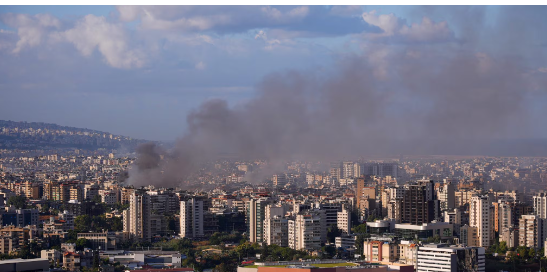
The Israeli army has confirmed that eight of its soldiers were killed during intense clashes in southern Lebanon as part of an ongoing offensive aimed at curbing the activities of militant groups in the region. The latest deaths mark a significant escalation in the already volatile situation along the Lebanon-Israel border, as fighting continues to intensify.
Tensions Rise Along the Border
The conflict, rooted in decades of political and territorial disputes, has flared up in recent weeks. Israel’s military operations in southern Lebanon are aimed at neutralizing threats posed by Hezbollah and other militant factions based in the region. These groups have launched several rocket and mortar attacks into Israeli territory, prompting Israel to respond with airstrikes and ground operations.
The deaths of the eight soldiers come as Israeli forces conduct sweeping operations in the area, targeting Hezbollah positions and other armed elements. The army has reported heavy resistance, with Hezbollah fighters employing guerrilla warfare tactics, using the rugged terrain to their advantage. In the most recent engagement, Israeli troops encountered fierce opposition during an attempted advance into a Hezbollah stronghold, leading to the deadly encounter.
Casualties and Military Response
The Israeli Defense Forces (IDF) spokesperson confirmed the loss of eight soldiers in the latest clash, offering condolences to their families. “These brave soldiers gave their lives in defense of our nation,” the spokesperson said in a statement. “We will continue to take necessary actions to protect our citizens and eliminate the threats that endanger Israel’s security.”
The military is reportedly mobilizing additional forces to the area in response to the growing conflict. A number of airstrikes were carried out in southern Lebanon following the news of the soldiers’ deaths, targeting Hezbollah’s weapons depots, command centers, and communication networks.
In addition to the fatalities, several other soldiers were injured in the operation. They were evacuated to nearby hospitals, where some remain in critical condition. Military sources indicate that this is the heaviest loss of life in a single operation since the offensive began, marking a turning point in the conflict. The Israeli public has reacted with a mixture of grief and anger, with calls for swift retribution and stronger military action.
International Reactions and Concerns
International leaders have expressed growing concerns over the escalation of violence in the region, warning of the potential for broader conflict. Lebanon’s government has condemned the Israeli military’s actions, accusing them of violating Lebanese sovereignty and causing civilian casualties during the airstrikes. Hezbollah, a powerful political and military organization in Lebanon, has vowed to continue resisting Israeli aggression, stating that they will “inflict severe losses on the enemy.”
Meanwhile, the United Nations and several Western nations have called for restraint on both sides, urging dialogue and de-escalation to prevent a full-scale war. UN peacekeeping forces stationed in southern Lebanon have been on high alert, with additional patrols being deployed along the Blue Line, the demarcation line established by the UN to separate Israeli and Lebanese territory.
The Broader Context
This recent clash is part of a broader, long-standing conflict between Israel and Hezbollah, which has its roots in the Israeli occupation of southern Lebanon that began in 1982. Though Israel officially withdrew in 2000, tensions have simmered along the border, with occasional outbreaks of violence. Hezbollah, which receives substantial support from Iran, has long been a thorn in Israel’s side, using southern Lebanon as a base to launch attacks and maintain a military presence.
The current offensive by Israel is one of the most intense in recent years, and analysts fear it could spiral into a wider regional conflict. Iran, Hezbollah’s chief ally, has issued strong warnings to Israel, hinting at possible retaliatory actions if the situation worsens. The Syrian government, another close ally of Hezbollah, has also voiced support for the militant group.
Calls for De-escalation
Despite the rising toll on both sides, international diplomats are pushing for peace talks and negotiations to avoid further bloodshed. The United States has offered to mediate discussions between Israel and Lebanon, although both sides have shown little interest in dialogue at this stage.
The deaths of the eight soldiers have further complicated the prospects for peace. Israel, emboldened by its determination to secure its borders and dismantle Hezbollah’s military capabilities, is unlikely to ease its military campaign anytime soon. On the other hand, Hezbollah, which considers itself a defender of Lebanon’s sovereignty, remains resolute in its resistance.
As the conflict unfolds, the people living in southern Lebanon and northern Israel continue to bear the brunt of the violence. Thousands of civilians have been displaced, and many are seeking refuge in safer areas as fears of an all-out war loom.
For now, the focus remains on the battlefield, where both sides prepare for what could be a protracted and bloody conflict. The deaths of the eight Israeli soldiers mark a grim chapter in the ongoing war, and the world watches anxiously as the situation threatens to escalate even further.
